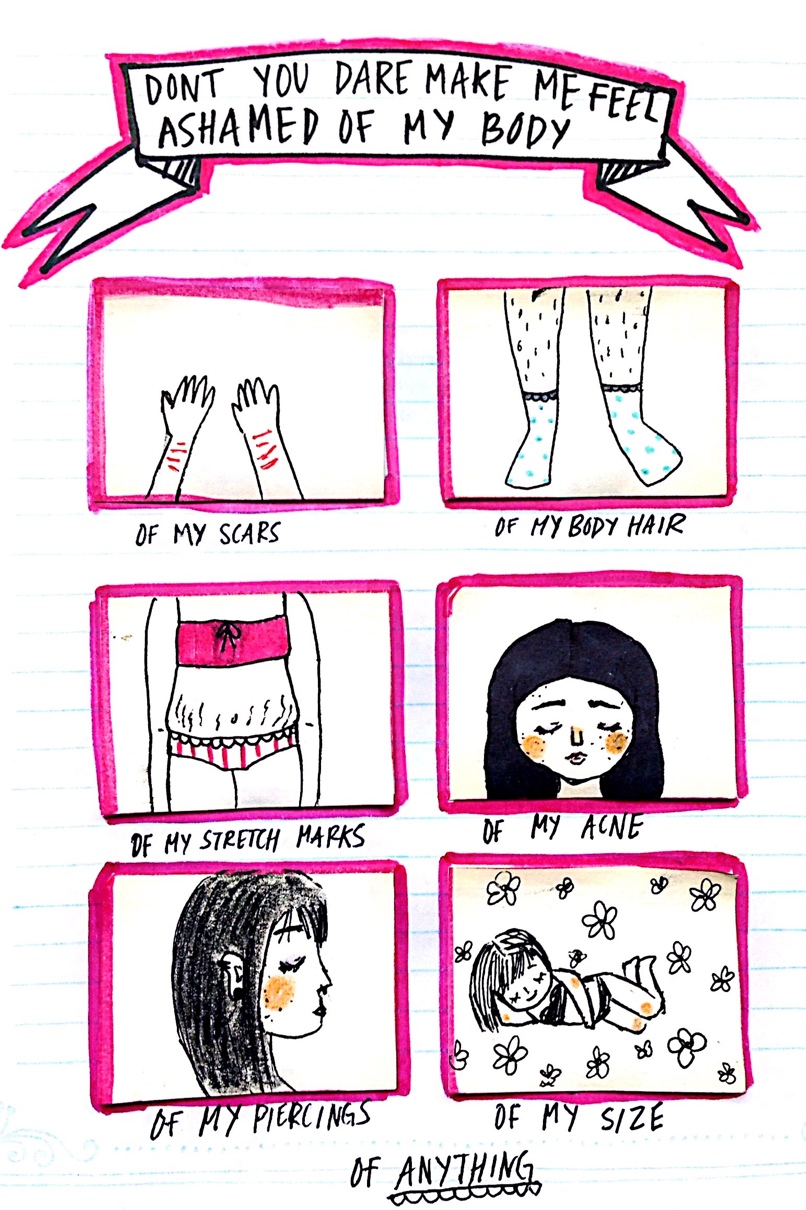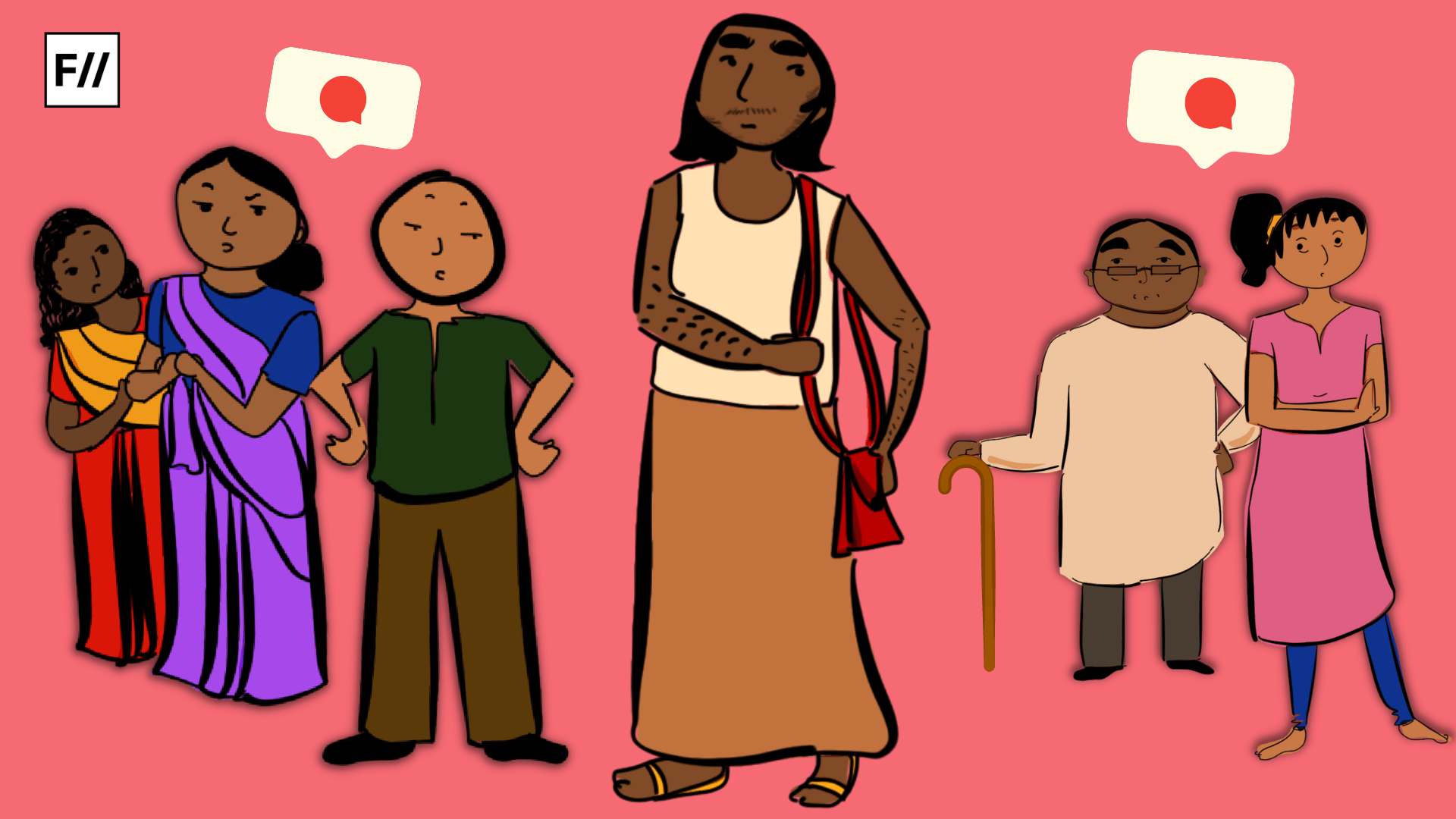Editor’s Note: September is PCOS Awareness Month, and we are curating pieces on the varied aspects of PCOS. If you would like to submit an article, kindly write to info@feminisminindia.com
Have you wondered why that thick patch of hair above your lip or on the side of your chin makes you uncomfortable? Is it really the hair or the comments on it that worry you?
Being “joked” to about having a moustache thicker than your male friend might not be a new thing to you, if you are a woman who battles Polycystic Ovaries Syndrome (PCOS) related facial hair growth. The “funny” uncles and friends who doubt if you really are a woman since you have more facial hair than the men and/or women around, may also not be unfamiliar.
Body shaming is not a joke. In the context of PCOS, body shaming not only ruins the confidence of an individual, but also drowns down the actual physical and mental health concerns that need to be addressed while the focus is shifted to “flaws” that go against the popular perceptions of an “ideal” female body.

Hirsutism or excessive hair growth on the face, chest and other body parts of females can be a symptom or a consequence of PCOS, which is commonly associated with the excessive production of androgens. Androgens are typically male growth hormones, but the female body produces them in small amounts as well.
People with PCOS are prone to excessive androgen production resulting in the presence of bodily hair in women at places where they usually only are found in male bodies. It is cited that 10 per cent of the women who suffer from PCOS develop hirsutism as a resultant effect.
In fact the hairless ideal has three cultural functions. Firstly, it highlights the difference between men and women, secondly, it connotes the “to-be-looked-at-ness” of the female body and thirdly, it defines female attractiveness and youthfulness, thereby prescribing how beautiful female bodies must look
Along with the excruciating pain of irregular periods, constant mood swings and exhaustion, the sting of comments on physical appearances add to the uphill battles of people with PCOS. From personal experience, I can say that fighting these insecurities is not easy. Despite reassurances and self discipline, accepting our so called flaws can be out of our hands sometimes.
It is important to unpack the biased social standards which form the root cause of our concerns about physical appearance and analyse how these constructs make us prey to the larger capital market that feeds off our insecurities.
Society, culture, body image: The persuasion of a hairless body
The ideal of a hairless body is carefully intertwined in sexist standards of the society which mandates hairlessness on certain parts of the female body. This is treated as a cultural marker of femininity. The affinity towards thick long hair that cascades till the knees and the sheer disgust towards facial hair at the same time is conflicting and problematic.
In fact the hairless ideal has three cultural functions. Firstly, it highlights the difference between men and women, secondly, it connotes the “to-be-looked-at-ness” of the female body and thirdly, it defines female attractiveness and youthfulness, thereby prescribing how beautiful female bodies must look.
Also read: Hairy And Proud: Body Hair Removal Through A Feminist Lens
The ‘concern’ around facial and body hair that attracts remedial methods is not out of an awareness of the medical condition but due to the constant need to align female identity to an ideal beauty standard. The capitalist, patriarchal female identity is meticulously constructed around body hair – what kind of hair, at what length and at what places are “ideal” for a woman’s body.

We have adjusted ourselves to accept the ideal of a hairless body to an extent that a diversion from the norm is considered a distortion. The idea is reinforced by other cultural discourses like the advertisements of depilation products and laser treatments. The fact that these advertisements show women shaving their already hairless body explicates the grave intolerance towards female body hair.
The cultural attributes of most of the societies in the world have adjusted itself to hairlessness since time immemorial. We have evidence even from early Roman civilisation where depilation of the female body was a marker of class.
Considering the hormonal imbalances that present along with PCOS, the most important and consistent thing to do is to maintain a PCOS friendly lifestyle. However, the concern over hairy bodies has got us to water the leaves instead of the roots. It not only normalises hairless bodies, but also does not even consider living with a hairy body as an option
Today, hair removal has become a need rather than a want which problematises the entire discourse of femininity and the female body. The need to manage PCOS is subsumed by the quest to fit into the ideal body. The body shaming associated with it also has resulted in gross ignorance of important symptoms that need to be addressed.

Considering the hormonal imbalances that present along with PCOS, the most important and consistent thing to do is to maintain a PCOS friendly lifestyle. However, the concern over hairy bodies has got us to water the leaves instead of the roots. It not only normalises hairless bodies, but also does not even consider living with a hairy body as an option.
Making peace with features that are deemed abnormal is very difficult. Despite genuine efforts, rarely at least, I myself succumb to social expectations and become a person who takes refuge in depilatory techniques as I fail to hold up against the unsolicited recommendations and the sheen of hairless legs and clear faces.
It can be extremely offensive and sad when someone points towards the hairy patches on your chin and cheek in a derogatory, judgmental manner.
The onus of pleasing the society and going by a rule book should not be on women or any gender for that matter. Cultural products including films and advertisements have a major role to play in stigmatising hairy women. It is not to deny the right of a person to shave but the act of shaving should be a choice rather than an social imposition. PCOS is already an exhausting condition to deal with and this additional stigma should not be the burden of people with PCOS

Secondary sexual characteristics like facial hair should not be the marker of one’s sexuality, beauty, worth, or a cue to tease them. It is high time that we make peace with the fact that everybody is different in their own way and it cannot be measured against a singular ideal.
The onus of pleasing the society and going by a rule book should not be on women or any gender for that matter. Cultural products including films and advertisements have a major role to play in stigmatising hairy women. It is not to deny the right of a person to shave but the act of shaving should be a choice rather than an social imposition. PCOS is already an exhausting condition to deal with and this additional stigma should not be the burden of people with PCOS.
Also read: PCOS And Eating Disorders: The Relationship With Food Is Complicated For People With PCOS
Featured Image: Ritika Banerjee for Feminism In India
About the author(s)
Anagha is a postgraduate student who is interested in the field of gender studies and sociology. She hopes to make the world a better place for all genders, one step at a time. Being a person who tries to make things better around her, she is in a constant process of learning and unlearning. Reading and gardening are her escape from the daily hustle




